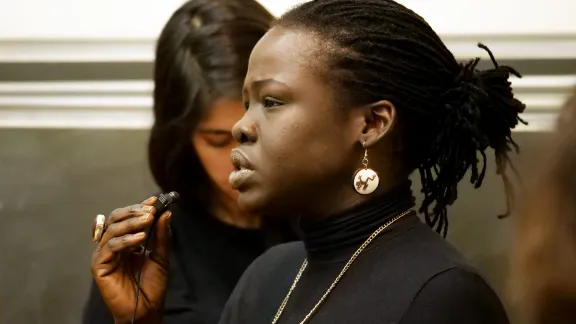
An activist against sexual violence in conflict speaks up during an LWF event together with the Mukwege foundation in November 2019. LWF is working with the Mukwege foundation and SEMA, a global network of survivors to end wartime sexual violence in 21 countries. Photo: LWF/ L. Gillabert
LWF statement addresses human rights abuses by armed forces and civilians
(LWI) - The Lutheran World Federation (LWF) has expressed “deep concern” about the high incidence of sexual and gender-based violence in South Sudan.
In a statement at the 45th session of the United Nations Human Rights Council, LWF stated that “even after the signing of the revitalized peace agreement, women and girls in particular, continue to experience sexual harassment, sexual assault and rape, including gang rape, perpetrated by the organized armed forces, armed youth and civilians.”
End culture of impunity
“Sexual and gender-based violence contributes to physical harm of the victims, but also to emotional pain and post-traumatic stress disorder, as well as to sexually transmitted infections, social isolation, school dropouts, unwanted pregnancies, forced marriages and even death,” said LWF Advocacy Officer for Human Rights, Dr. Emmanuel Gore, who presented the statement on LWF’s behalf.
Even after the signing of the revitalized peace agreement, women and girls in particular, continue to experience sexual harassment, sexual assault and rape, including gang rape, perpetrated by the organized armed forces, armed youth and civilians.
LWF urged the South Sudanese government to “end the prevailing culture of impunity" surrounding sexual violence. It called upon the government to adopt survivor-centered responses that provide protection, health and psychosocial support services to the survivors of sexual and gender-based violence. LWF also called upon the local administration to ensure an effective implementation of the legal mechanisms in place, and to strengthen the multi-sectoral approach, to ensure effective prevention and response mechanisms.
LWF in South Sudan works with refugees and vulnerable communities in Jonglei, Ruweng, Upper Nile and Eastern and Central Equatoria States. Through its Rights-Based Approach, LWF seeks to strengthen civil society. LWF also contributes to the Universal Periodic Review of the Human Rights Council by collecting and submitting information in the communities it serves.


